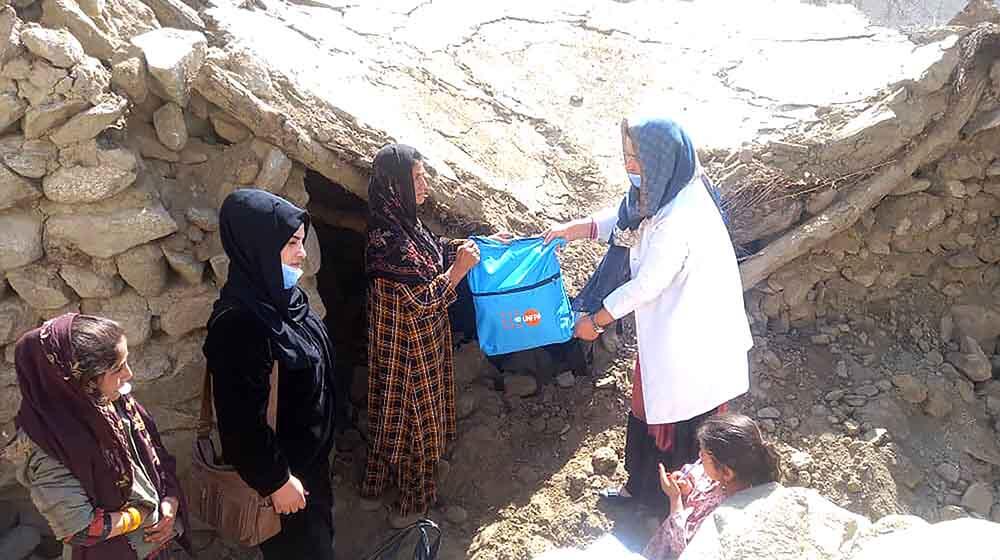Takhar, Afghanistan – “I thought the end of the world was coming and that we may not be able to survive.” It was a few minutes of terrifying experience that Salima* will remember for the rest of her life.
Last 21 March, a magnitude 6.5 earthquake struck Badakhshan province in northeastern Afghanistan, which was felt in nearby provinces and bordering countries in central and south Asia.
In Warsaj district of Takhar province about 230 kilometers away from Badakhshan, Salima was about to go to bed when the earth started shaking at around 9:17 p.m. local time. It took a few seconds and then it became a faint tremor. A couple of seconds later, another wave of tremor took place. This time, it was so strong that Salima decided to run for her life.
“I just ran out of the room barefooted,” Salima recalls. “The shaking got stronger and the roof of my house collapsed.”
In those crucial moments, the 28-year-old Salima pulled herself together and looked for her mother. She found the old lady unconscious. “I was so worried because I thought that she had died. Thankfully, she regained consciousness.”
When the shaking stopped, Salima thought everyone in the village was dead. Even the three sheeps and a cow that she relied on for a living were killed when the roof of her house fell. In the aftermath of the earthquake, UNOCHA said at least five people were killed and 80 were injured, while 653 houses were damaged, leaving several families without shelter. The earthquake also resulted in losses to the people’s livelihood.
While Salima is thankful that she and her mother survived the earthquake, the experience made a significant impact on her psychological well-being. Just like everyone in her village, Salima is trying to contend with the ongoing humanitarian crisis in Afghanistan. But to go through a harrowing experience at the same time is extremely stressful.
UNFPA and its partner HEWAD, a non-governmental organization in Afghanistan, were quick to deploy psychosocial counselors to Salima’s village to provide psychological first aid for women and girls affected by the earthquake.
Two counselors from the UNFPA-supported Women Friendly Health Space (WFHS) funded by the government of Denmark, and the Psychosocial Counseling Centre (PSCC) funded by the Afghanistan Humanitarian Fund in Takhar were able to provide the much-needed immediate support.
“We were the first responders, we saw the damaged houses and provided emotional support to women, we listened to them,” narrates one of the psychosocial counselors, who was trained by UNFPA on psychological first aid, enabling her to help communities in crisis.
Through HEWAD, and with support from the Italian government, UNFPA also distributed Dignity Kits to support the women and girls with their personal hygiene needs. About 50 kits were initially distributed in the village. It is part of the nearly 9,000 Dignity Kits available in the country and ready for immediate distribution when needed. Each kit contains essential items that specifically address the special needs of women and girls in an emergency setting, such as undergarments, sanitary pads, towels, head covering, soap and shampoo.
Psychological first aid and other forms of psychosocial support can help to mitigate the negative effects of these events on the target population. Psychosocial support aims to promote psychological resilience, reduce distress, and promote healing in individuals and communities affected by emergencies.
“I was frightened and sad because I lost everything, our house, our livestock,” Salima says. “But I am relieved and thankful, too, that the women (psychosocial counselors) came to help us in this difficult time.’’
Afghanistan is highly prone to natural hazards, whose frequency and intensity are exacerbated by the effects of climate change, increasing humanitarian needs, and structural limitations in mitigating disaster impact.
UNFPA works with its frontline NGO partners on the ground in all eight regions to provide immediate support to the reproductive health and psychosocial needs of crisis-affected populations, especially women and girls. UNFPA has also prepositioned stocks of lifesaving commodities to ensure the availability of maternal and reproductive health care, as well as prevention and response to gender-based violence, when needed.
*Name changed to protect privacy.
(Story contributed by Ancy Ipe, MHPSS Specialist)


